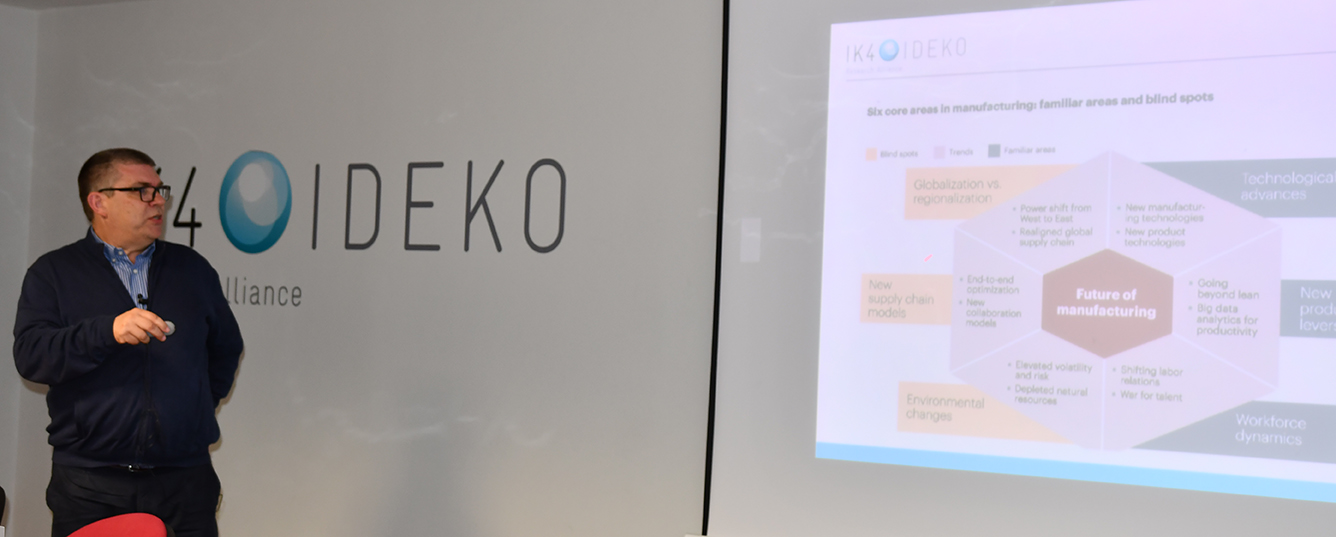Last news about IDEKO.

On 30 May, the IK4-IDEKO technology centre will take part in a seminar that will address the manufacturing challenges of the future.
The Elgoibar organisation will contribute its knowledge in fields such as advanced manufacturing and the production of fault-free parts, a technology called Zero Defect Manufacturing.
How is machine production progressing? How can we prevent parts being manufactured with surface faults? How will robotics and the laser be used in future manufacturing processes? These are some of the questions that will be addressed in the seminar "What and how will we produce in 2025?", an event at which the IK4-IDEKO technology centre will have a strong presence.
The purpose of the event, which will take place on 30 May and is organised by the specialist magazine IMHE, is to debate industrial progress and the manufacturing challenges of the future.
In several presentations, the research organisation will cover subjects such as advanced manufacturing and the production of fault-free parts, a technology called Zero Defect Manufacturing, which will be based on the knowledge and experience acquired over its long history in the field of manufacturing and industrial production.
Zero Defect Manufacturing
IK4-IDEKO's international project manager, Juan Antonio Arrieta, will explain that Zero Defect production is one of the main goals of advanced manufacturing consisting of preventing the risk of possible faults in motor and other vital component parts in sectors such as the aeronautic, railway, automotive or wind power.
Furthermore, the researcher will describe the strategy of this complex technology that covers all the phases of the production of a product, from the design to the assembly phase, through casting, forging and manufacture.
According to Arrieta, the close relationship with the 4ZDM
cluster has given IK4-IDEKO a deep understanding of this innovative technology:
"IK4-IDEKO leads the 4ZDM cluster that brings together the European R&D
projects regarding ZDM. This environment has become one of the European
benchmarks in Zero Defect Manufacturing. Since 2012, it has coordinated several
international projects, and has taken up a leading position with a major
presence and influence in Europe. A recognition that is also reflected in the
Basque country".
Currently, IDEKO participates in 3 European initiatives that try to implement Zero Defect systems. One of them is ForZDM, in which one of the objectives is the reduction of defects in the manufacture of axes for railway in CAF. Specifically, we have developed a data collection system in real time, which detects the defects that are dealt with in the foundation, the force and the cutting of the axis and allows modifying the manufacturing flow thereof to minimize, and even eliminate , the effect of these defects.
Another project in which the Research Center is working actively is QU4LITY, in the scope of this project, a ZDM model of service and product based on data, open and standardized is being developed. QU4LITY aims to European industry to develop ZDM strategies that provide competitive advantages such as significant increase in operational efficiency, scrap reduction, prescriptive quality management, energy efficiency, defect prevention and improving the customer experience with intelligent products through an ecosystem of open platforms, such as ZDM atomized components and digital enablers.
Finally, it is worth mentioning the contribution of IDEKO to the European project ZAero, which aims at the development of inline quality control methods for carbon fibre parts production (CFRP) and a decision support system. This initiative has recently been awarded in the category of "Aeronautical Processes" of the Innovation Awards granted by JEC Company. The objective of the ZAero project is the development of a new defect-free manufacturing process for large-sized composite parts aimed at the aeronautical sector. The objective of IDEKO within this project has been to develop a traceable calibration system for on-board machine measurement systems, consisting of a mechatronic device combined with a high-precision multi-camera system. Likewise, a simulation tool has been created to predict and study the accuracy of vision systems scenarios.
Machining process
The machining sector has also experienced significant changes in recent years. The national project manager, José Ángel Marañón, will review the environment of this production technology, and also highlight the latest innovations that have been exhibited at the main manufacturing fairs and congresses.
Marañón will talk about the factors that influence the machining process, such as the material, cutting parameters, the type of swarf produced, temperature increases and the surface finish of the part. He will also mention what is going on in the field of machining bearing in mind the sources of problems.
"Innovations in manufacturing advances are focused on digitalisation, but there is life beyond this. We will talk about the latest trends, developments and technologies around 5 axes machining such as, for example, machining of large parts, processes and strategies, multitask machines, the evolution of the tools and fixtures" explained the expert.
Furthermore, the seminar will also be used to analyse the applications of robotics and the laser in manufacturing processes, as well as the management of talent and the latest trends.
In addition to IDEKO's participation, this year's seminar will also have the collaboration of ACORDE and IK4-TEKNIKER, in whose facilities, in the Guipuzcoan town of Eibar, the seminar will take place.
The session will be sponsored by NSK, SCHUNK, STÄUBLI, STRATASYS and VARGUS.
About IK4-IDEKO
The Basque technology centre, IK4-IDEKO prizes its 30-year track record devoted to research, development and innovation of new technologies applied to manufacturing and industrial production.
It was founded to respond to the high technology component challenges of the machine-tool companies of the Mondragón Corporation, and today it has more than a 100 researchers and a portfolio of more than 50 customers a year.
Its R&D&I activity is geared towards offering innovative solutions that contribute to the competitiveness of businesses, and it is spread across 4 research groups: Dynamics and Control, Manufacturing Processes, ICTs and Design and Precision Engineering.